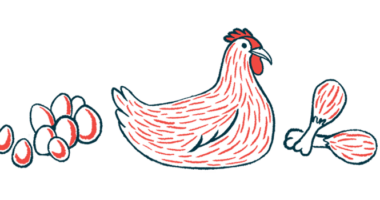Low-calorie keto diet for Cushing’s can lead to better metabolic health
5-week diet helps lower body weight, blood pressure, cholesterol in small study

A five-week, low-calorie ketogenic diet led to weight loss and reduced blood pressure in people with Cushing’s disease in a small study.
The diet also lowered blood levels of cholesterol and other fatty molecules, but did not alter cortisol levels, which are typically elevated in Cushing’s patients.
Findings were reported in the study “Nutritional Intervention in Cushing’s Disease: The Ketogenic Diet’s Effects on Metabolic Comorbidities and Adrenal Steroids,” which was published in the journal Nutrients.
Cushing’s often leads to weight gain, high blood pressure
Cushing’s disease is caused by a tumor in the brain’s pituitary gland that triggers the excess production of the stress hormone cortisol. High cortisol levels drive Cushing’s symptoms, which commonly include weight gain and high blood pressure.
A ketogenic diet is high in fats but low in carbohydrates, and gets its name because when the body burns fat for energy instead of carbohydrates, it produces molecules called ketone bodies. This diet is used to control seizures in certain forms of epilepsy, and there has been much interest in its potential for other health conditions, including certain metabolic disorders like diabetes.
In the study, researchers set out to evaluate the effects of a low-calorie ketogenic diet when used as an add-on to medical treatment in people with Cushing’s disease.
The study involved 15 people with Cushing’s, as well as 15 individuals without the disease (controls), who underwent a five-week diet program.
For the first three weeks, participants were given four replacement meals (breakfast, lunch, snack, and dinner), along with two portions of a low-sugar vegetable for lunch and dinner, for a total of about 670 kilocalories per day. Then, in the last two weeks, one of the replacement meals was replaced with a conventional protein meal for about 820 kilocalories per day.
Participants also took a multivitamin throughout the five-week study. The replacement meals used in the study were provided by the Italy-based company New Penta.
All participants completed the five-week study, though some adverse reactions to the diet were reported, such as headache, hunger, and constipation.
After the five-week study, patients with Cushing’s disease had a significantly decreased body mass index — a measure of body fat that takes into account weight and height. Measures of waist circumference also decreased significantly following the diet, as did measures of both systolic and diastolic blood pressure.
Ketogenic diet for Cushing’s reduced triglycerides, ‘bad’ cholesterol
Levels of triglycerides, a type of fatty molecule, in the blood also decreased significantly, as did levels of total and LDL cholesterol (the so-called “bad” cholesterol). Meanwhile, levels of vitamin D and HDL cholesterol (commonly referred to as “good” cholesterol) increased after the diet.
The results were generally similar in the control group. In both groups, the diet did not notably impact cortisol levels.
While the study was limited by its small size and short duration, the researchers noted, its findings support the idea that, at least in the short term, a low-calorie ketogenic diet may help normalize metabolic and cardiovascular parameters in Cushing’s patients.
“The current study confirms that a ketogenic diet is effective in improving metabolic disorders in [Cushing’s disease] and shows that a nutritional approach may be combined with conventional [Cushing’s disease] therapy in order to improve metabolic and cardiovascular comorbidities,” the team wrote.








